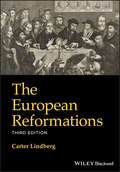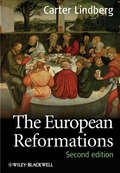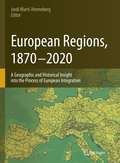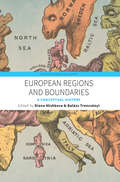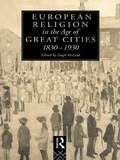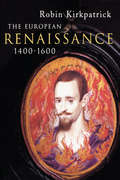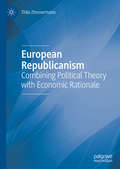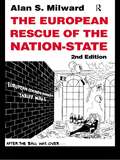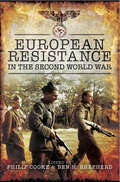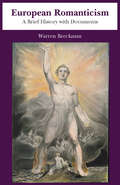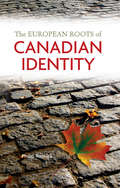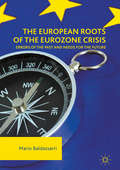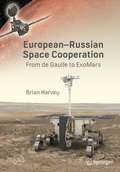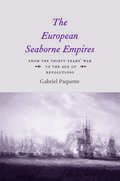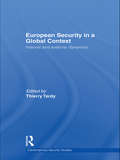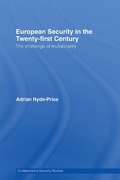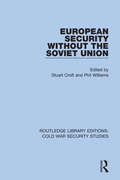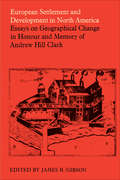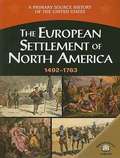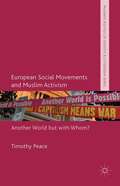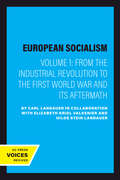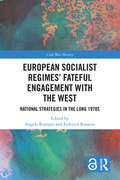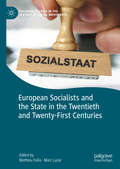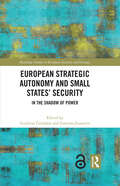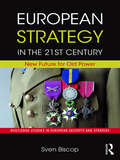- Table View
- List View
The European Reformations
by Carter LindbergRediscover the Reformations in Europe with this insightful and comprehensive new edition of a long-time favorite Amongst the authoritative works covering the European Reformation, Carter Lindberg’s The European Reformations has stood the test of time. Widely used in classrooms around the world for over twenty-five years, the first two editions of the book were enjoyed and acclaimed by students and teachers alike. Now, the revised and updated Third Edition of The European Reformations continues the author’s work to sketch the various efforts to reform received expressions of faith and their social and political effects, both historical and modern. He has expanded his coverage of women in the Reformations and added a chapter on reforms in East-Central Europe. Comprehensively covering all of Europe, The European Reformations provides an in-depth exploration of the Reformations’ effects on a wide variety of countries. The author discusses: The late Middle Ages and the historical context in which the Reformations gained a foothold Martin Luther, the theological and past
The European Reformations
by Carter LindbergCombining seamless synthesis of original material with updated scholarship, The European Reformations 2nd edition, provides the most comprehensive and engaging textbook available on the origins and impacts of Europe's Reformations - and the consequences that continue to resonate today.A fully revised and comprehensive edition of this popular introduction to the Reformations of the sixteenth centuryIncludes new sections on the Catholic Reformation, the Counter Reformation, the role of women, and the Reformation in BritainSets the origins of the movements in the context of late medieval social, economic and religious crises, carefully tracing its trajectories through the different religious groupsSucceeds in weaving together religion, politics, social forces, and the influential personalities of the time, in to one compelling storyProvides a variety of supplementary materials, including end-of-chapter suggestions for further reading, along with maps, illustrations, a glossary, and chronologies
European Regions, 1870 – 2020: A Geographic and Historical Insight into the Process of European Integration
by Jordi Martí-HennebergThis volume explains the national and regional border modifications that took place in Europe from 1870 to 2020. It provides insights that allow us to understand boundary changes for several different levels of territorial organization. The text describes the state formation process related to the regional-administrative structures in each European country, and offers insight into the degree of centralization historically by describing the extent of legislative autonomy at different administrative levels and the competences reserved for each of them. The book sheds light on the complex regional organization of Europe and the difficulties its reform has faced. The main audience will be academics and PhD/Masters students working in a variety of geography fields, and the maps included in each chapter will also be of interest to a broader audience including undergraduate and secondary-school students wishing to better understand the political history of Europe.
European Regions and Boundaries: A Conceptual History (European Conceptual History #3)
by Diana Mishkova Balázs TrencsényiIt is difficult to speak about Europe today without reference to its constitutive regions—supra-national geographical designations such as “Scandinavia,” “Eastern Europe,” and “the Balkans.” Such formulations are so ubiquitous that they are frequently treated as empirical realities rather than a series of shifting, overlapping, and historically constructed concepts. This volume is the first to provide a synthetic account of these concepts and the historical and intellectual contexts in which they emerged. Bringing together prominent international scholars from across multiple disciplines, it systematically and comprehensively explores how such “meso-regions” have been conceptualized throughout modern European history.
European Religion in the Age of Great Cities: 1830-1930 (Christianity and Society in the Modern World)
by Hugh McLeodEurope in the nineteenth century saw spectacular growth in the size and number of cities and in the proportion of the population living in urban areas. Many contemporaries thought that this social revolution would bring about an equally dramatic change in religious life. This book, written by an international team of specialists, provides an authoritative account of religious change, both at the institutional and popular level, in Catholic, Protestant and Orthodox cities, in seven European countries.
The European Renaissance 1400-1600 (Arts Culture and Society in the Western World)
by Robin KirkpatrickWith Italy at its centre, but encompassing the whole of Renaissance Europe, this evocative history challenges some of the popularly-held views on the Renaissance period. In particular, whilst always acknowledging the brilliance and exhuberance of Renaissance culture, Robin Kirkpatrick draws equal attention to the strangeness and often unresolved tensions that lay beneath the surface of that culture.Insisting on a European rather than purely Italian viewpoint, he embraces Renaissance thinking and culture in all its diversity: from Northern thinkers such as Cusanus, Luther and Calvin, to the painting of Van der Weyden and El Greco, and the music of the Flemish musicians, Josquin des Prez and Orlando Lassus. Special attention is also paid to the unique contribution made by Margueritte of Navarre to the development of humanist culture. The book concludes with a study of Shakespeare in which his plays are viewed as a searching critique of some of the main principles of Renaissance culture.
European Republicanism: Combining Political Theory with Economic Rationale
by Thilo ZimmermannThis book presents current theories of European integration, such as federalism, neo-functionalism and liberal intergovernmentalism with their strengths and weaknesses. It is then argued that the combination of republican theory with public good theory, the res publica of public goods, could better explain European integration. Public good theory has, however, to be adopted in order to make it applicable to European republicanism. Finally, the book demonstrates how this new framework can influence further academic debates, such as on sovereignty and monetary integration, externalities of a common European market and the driving force of European integration. It is maintained that as the republican approach does not follow a pure economic logic, there remains space for political considerations and motivations.In this topical and interdisciplinary book, the author combines many important strings of European integration theory, history, economics and political sciences, which are clearly brought together into a coherent analytical discourse. Its strength is the interdisciplinary interaction between politics and economics, as well as theoretical and practical issues which are of high relevance for public debate in Europe. This book will be of interest to scholars and students interested in economic integration, as well as history and political philosophy.
The European Rescue of the Nation State
by Alan MilwardThis newly revised and updated second edition is the classic economic and political account of the origins of the European Community. On one level it is an original analysis of the forces which brought the EC together, on another it is an explanation based on historical analysis of the future relationship between nation-state and the European Union. Combining political with economic analysis, and based on extensive primary research in several countries, this book offers a challenging interpretation of the history of the western European state and European integration.
European Resistance in the Second World War
by Philip CookeResistance to German-led Axis occupation occurred all the way across the European continent during the Second World War. It took a wide range of forms – non-cooperation and disinformation, sabotage, espionage, armed opposition and full-scale partisan warfare. It is an important element in the experience and the national memory of the peoples who found themselves under Axis government and control. For over thirty years there has been no systematic attempt to give readers a panoramic yet detailed view of the make-up, actions and impact of resistance movements from Scandinavia down to Greece and from France through to Russia. This authoritative and accessible survey, written by a group of the leading experts in the field, provides a reliable, in-depth, up-to-date account of the resistance in each region and country along with an assessment of its effectiveness and of the Axis reaction to it. An extensive introduction by the editors Philip Cooke and Ben H. Shepherd draws the threads of the varied movements and groups together, highlighting the many differences and similarities between them.The book will be a significant contribution to the frequently heated debates about the importance of individual resistance movements. It will be thought-provoking reading for everyone who is interested in or studying occupied Europe during the Second World War.
European Romanticism: A Brief History with Documents
by Warren Breckman"The introductory essay is superb, the best short introduction to Romanticism I know. It is comprehensive, covering both the wide range of spheres that Romanticism affected--literature, philosophy, art, music, politics, nationalism--and the broad spectrum of European countries in which it was an influential cultural current. It offers a distinctive, unified interpretation of Romanticism that nonetheless does justice to the complexities of Romantic ideas." --Gerald Izenberg, Washington University in St. Louis
The European Roots of Canadian Identity
by Philip ResnickWhat makes Canada a different kind of society from the United States? In this book-length essay, Philip Resnick argues that, in more ways than one, Canada has been profoundly marked by its European origins. This is most apparent where the European historical underpinnings both of English-speaking and French-speaking Canada are concerned, but it is no less true when one examines Canada's multiple national identities, robust social programs, increasingly secular values and multilateral outlook on international affairs today. As the war in Iraq brought home, and the 2004 federal election reinforced, Canada is a more European-type society than is our neighbour to the south. This does not come without its own complexities or problems. On the contrary, there are significant parallels between the ambiguous versions of national identity that one finds in Canada and what one finds on the European continent. There are parallels, too, between the elements of self-doubt that characterize Canadians overall when they think about their country and those of Europeans caught up in their own, often fractious, attempts to forge a more integrated Europe. The author argues that Canada needs Europe as an effective counter-weight to the influence of the United States. He further argues that, at a deeper existential level, Canadians need relevant European references to better understand what makes them the kind of North Americans that they are.
The European Roots of the Eurozone Crisis
by Mario BaldassarriThis book examines the Eurozone crisis in light of theoretical and empirical evidence. The first half explores specific theoretical contributions within a framework of growth theory models to examine the two major pillars of the European construction, the European Central Bank and the Maastricht Treaty, and seeks to explain why they are theoretically wrong. The second half presents results of counterfactual simulations using the Oxford Econometric model and estimates what the Eurozone has lost in terms of economic and social cost from 2002 to 2014 as a consequence of the super-evaluation of the Euro and the Maastricht Treaty parameters being mistakenly fixed and pursued. Finally, the author supports the urgent need to refund the European Union, up-dating The Maastricht Treaty and the ECB statute to build three concentric circles: the USE (United States of Europe), the EU (European Union), the EAFTDA (Europe/Africa Free Trade and Development Area).
European-Russian Space Cooperation: From de Gaulle to ExoMars (Springer Praxis Books)
by Brian HarveyThe story of European-Russian collaboration in space is little known and its importance all too often understated. Because France was the principal interlocutor between these nations, such cooperation did not receive the attention it deserved in English-language literature. This book rectifies that history, showing how Russia and Europe forged a successful partnership that has continued to the present day.Space writer Brian Harvey provides an in-depth picture of how this European-Russian relationship evolved and what factors—scientific, political and industrial—propelled it over the decades. The history begins in the cold war period with the first collaborative ventures between the Soviet Union and European countries, primarily France, followed later by Germany and other European countries. Next, the chapters turn to the missions when European astronauts flew to Russian space stations, the Soyuz rocket made a new home in European territory in the South American jungle and science missions were flown to study deep space. Their climax is the joint mission to explore Mars, called ExoMars, which has already sent a mission to Mars.Through this close examination of these European-Russian efforts, readers will appreciate an altogether new perspective on the history of space exploration, no longer defined by competition, but rather by collaboration and cooperation.
The European Seaborne Empires: From the Thirty Years' War to the Age of Revolutions
by Gabriel PaquetteAn accessible survey of the history of European overseas empires in the seventeenth and eighteenth centuries based on new scholarship In this thematic survey, Gabriel Paquette focuses on the evolution of the Spanish, Portuguese, English, French, and Dutch overseas empires in the seventeenth and eighteenth centuries. He draws on recent advances in the field to examine their development, from efficacious forms of governance to coercive violence. Beginning with a narrative overview of imperial expansion that incorporates recent critiques of older scholarly approaches, Paquette then analyzes the significance of these empires, including their political, economic, and social consequences and legacies. He makes the multifaceted history of Europe’s globe-spanning empires in this crucial period accessible to new readers.
European Security in a Global Context: Internal and External Dynamics (Contemporary Security Studies)
by Thierry TardyThis new edited volume examines contemporary European security from three different standpoints. It explores security dynamics, first, within Europe; second, the interaction patterns between Europe and other parts of the world (the United States, Africa, the Middle East, China and India); and, finally, the external perceptions of European security. The first part of the book analyses the European security landscape. The roles of EU, NATO and the OSCE are given particular attention, as is the impact of their evolution- or enlargement- on the European security architecture and European security dynamics. In this context, Russia’s repositioning as a major power appears as a shaping factor of contemporary European geopolitics. The second part presents European security from an external perspective and considers interactions between Europe and other states or regions. Security trends and actors in Europe are examined from an American, Chinese, and Indian perspective, while Europe--Africa and Europe--Middle East relations are also addressed. This book will be of great interest to students of European Security, European politics and IR in general.
European Security in the Twenty-First Century: The Challenge of Multipolarity (Contemporary Security Studies)
by Adrian Hyde-PriceCombining a sophisticated theoretical analysis with detailed empirical case-studies, this book provides an original view of the challenges and threats to a stable peace order in Europe. The end of Cold War bipolarity has transformed Europe. Using structural realist theory, Adrian Hyde-Price analyzes the new security agenda confronting Europe in the twenty-first century. Europe, he argues, is not ‘primed for peace’ as mainstream thinking suggests, rather, it faces new security threats and the challenge of multipolarity. This critical and original volume looks at European security after the Iraq War, the failure of the EU constitution and the change of government in Germany. Reflecting on the inherently competitive and tragic nature of international politics, it concludes that realism provides the only firm foundations for an ethical foreign and security policy. European Security in the Twenty-First Century will appeal to students and scholars of international relations, European politics and security studies.
European Security without the Soviet Union (Routledge Library Editions: Cold War Security Studies #25)
by Stuart Croft; Phil WilliamsThis book, first published in 1992, examines the changing post-Cold War changing patterns of security in Europe by analysing the major themes, the primary security organisations and the policies of countries at the forefront of the security debate. Leading experts discuss the problems of nationalism, the difficulties of peacekeeping in Europe, and the future of NATO.
European Settlement and Development in North America
by James R. GibsonAndrew Hill Clark (1911-1975) was responsible for much of the recent rise of historical geography in North America. The focus on his research was the opening of New World lands by European peoples, and this North American experience is the subject of this collection of essays written by eight of Clark's students. They examine the role of a new physical and economic environment – particularly abundant and cheap land – in the settlement of New France, the cultural and physical problems that conditioned Russian America, the transformation of cultural regionalism in the eastern United States between the late colonial seaboard and the early republican interior, the changing economic geography of rice farming on the antebellum Southern seaboard, the interrelationships of the European and Indian economies in the pre-conquest fur trade of Canada, differential acculturation and ethnic territoriality among three immigrant groups in Kansas in the late nineteenth and early twentieth centuries, the development in England and the United States of similar social geographic images of the Victorian city, and the erosion of a sense of place and community by possessive individualism in eighteenth-century Pennsylvania. The essays are preceded by an appreciation of Clark as an historical geographer written by D.W. Meinig and are brought together in an epilogue by John Warkentin. The work is an unusually consistent Festchrift which should appeal to all interested in the patterns of North American settlement.
The European Settlement Of North America (A primary Source History Of The United States )
by George Edward StanleyFulfill the need to incorporate primary sources in your American history reports and projects with this engaging series. Each book uses a variety of primary source documents to provide a unique perspective on historical events. <p><p>Public documents, including newspaper articles, speeches, historic acts of legislation, and treaties give readers a broader understanding of the events that shaped our nation, while personal diaries and letters provide intimate portraits of the people who influenced or witnessed those events. Featuring words drawn straight from the shapers of history, this captivating series gives readers a richer understanding of the nation's history.
European Social Movements and Muslim Activism
by Timothy PeaceHow do progressive social movements deal with religious pluralism? In this book, Timothy Peace uses the example of the alter-globalisation movement to explain why social movement leaders in Britain and France reacted so differently to the emergence of Muslim activism.
European Socialism, Volume I: From the Industrial Revolution to the First World War and Its Aftermath
by Carl LandauerThis title is part of UC Press's Voices Revived program, which commemorates University of California Press’s mission to seek out and cultivate the brightest minds and give them voice, reach, and impact. Drawing on a backlist dating to 1893, Voices Revived makes high-quality, peer-reviewed scholarship accessible once again using print-on-demand technology. This title was originally published in 1959.
European Socialist Regimes' Fateful Engagement with the West: National Strategies in the Long 1970s (Cold War History)
by Angela Romano; Federico RomeroThis edited volume analyses European socialist countries’ strategy of engagement with the West and the European Economic Community in the long 1970s. The book focuses on a time when the socialist regimes of Central and Eastern Europe banked their hopes for prosperity and stability on enhanced relations with the West. Crossing the traditional differences among diverse fields of historiography, it assesses the complex influence of European and global processes of transformation on the socialist elites’ reading of the international political and economic environment and their consequent decision-making. The volume also explores the debate in each country among and within the elites involved in policymaking as they elaborated this strategic view and coped with shortcomings and unexpected turns. A comparative analysis of national cases shows a shared logic and common patterns, together with national variations and a plurality of views on the desirability of exchanges with their capitalist neighbours and on the ways to promote them. The multinational coverage of seven countries makes this volume a starting point for anyone interested in each socialist state’s foreign policy, intra-bloc relations, economic strategy, transformation and collapse, relations with the European Community and access to the EU. This book will be of much interest to students and researchers of Cold War Studies, European history, and International Relations.
European Socialists and the State in the Twentieth and Twenty-First Centuries (Palgrave Studies in the History of Social Movements)
by Mathieu Fulla Marc LazarThis edited volume promotes a comparative and transnational approach to the complex and ambiguous relationship between West European socialism and the contemporary state over the longue durée. It encourages a better understanding of socialism while also casting an original light on the history of the contemporary state in Europe. Socialists have been a prime political force since the late nineteenth century through to the present. Through their strength, their presence at the heart of societies, their dynamism, inventiveness, and influence, they have left their mark on the European physiognomy and helped to forge part of its identity. This is particularly true where the welfare state is concerned, and the role played by the state in constructing, embedding, and extending this social model. Surprisingly, there has been no research aiming to systematically analyse the relationship between socialism and the state. This volume fills a gap in knowledge by rejecting the media simplification and political polemic maintained by opponents of socialism – and sometimes by socialists themselves – which systematically links socialism with “statism”. It focuses on numerous case studies involving France, Italy, Spain, Greece, Austria, Germany, Belgium, the United Kingdom and Scandinavia, and highlights the diversity of organisations within European socialism. Ultimately, this book demonstrates that the fate of this political culture depends on the socialist parties themselves but also on any new configurations that states may assume. Conversely, the future of states will also depend partly on the choices made by socialists, if they still exist and still have the means to shape decisions and make their voices heard.
European Strategic Autonomy and Small States' Security: In the Shadow of Power (Routledge Studies in European Security and Strategy)
by Giedrius Česnakas Justinas JuozaitisThis book analyses whether the EU’s drift towards European strategic autonomy presents a challenge or a window of opportunity for its small member states to advance their security interests. The volume presents small states’ perceptions of European strategic autonomy, highlighting their expectations and concerns. The chapters focus on the depth and breadth of European strategic autonomy, national security considerations, assessment of the impact on transatlantic relations, the expected outputs, and its potential impact on the EU’s institutional structure. It also shows how systemic circumstances and the interests of powerful states, either belonging to the EU (France, Germany, and Poland) or having a significant say in European security architecture (the US), establish opportunities and constraints for the small states to shape European strategic autonomy. In particular, the study focuses on the diverging interests of the Baltic states (Estonia, Latvia, and Lithuania), Belgium, Denmark, Greece, Hungary, and the Netherlands. It demonstrates that, in most cases, European strategic autonomy is perceived not as an alternative to NATO but as a supplementary element that could facilitate the development of national military capabilities, indigenous defence industries and resilience to non-military threats. Ultimately, the book suggests that national approaches towards European strategic autonomy mainly stem from pragmatic national security and foreign policy considerations, while largely ignoring grand strategic ideas. This book will be of much interest to students of European politics, security studies, and international relations.
European Strategy in the 21st Century: New Future for Old Power (Routledge Studies in European Security and Strategy)
by Sven BiscopThis book argues that Europe, through the European Union (EU), should act as a great power in the 21st century. The course of world politics is determined by the interaction between great powers. Those powers are the US, the established power; Russia, the declining power; China, the rising power; and the EU, the power that doesn’t know whether it wants to be a power. If the EU does not just want to undergo the policies of the other powers it will have to become one itself, but it should differ in its strategy. In this book, Sven Biscop seeks to demonstrate that the EU has the means to pursue a distinctive great power strategy, a middle way between dreamy idealism and unprincipled pragmatism, and can play a crucial stabilizing role in this increasingly unstable world. Written by a leading scholar, this book will be of much interest to students of European security, EU policy, strategic studies and international relations.
